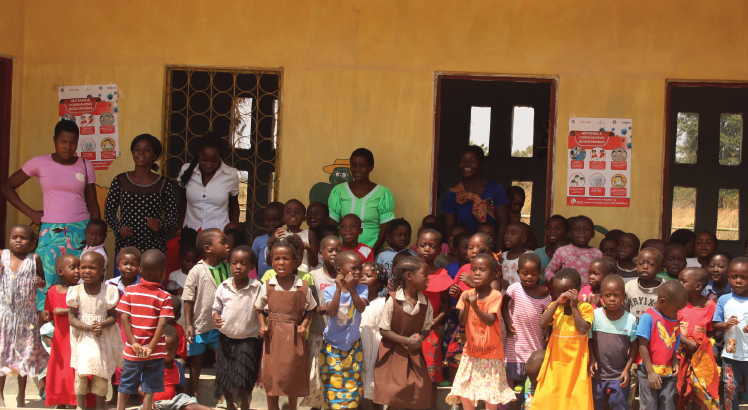Recognised after 15 Years of volunteering
In 2007, Billy Kasinika from Mchekeni Village, Traditional Authority Njewa in Lilongwe District decided to establish a community-based childcare centre (CBCC) as one way of making his area a better place for children.
He says at that time, only children from well-to-do families could afford the privilege of accessing a kindergarten education.
Says Kasinika: “I had two young children at that time and from my small-scale business and little salary from my job as a security guard, I was managing to pay for their fees which was at K500 at a certain kindergarten.”
He says since he could not afford to rent a house for the CBCC, he decided to use his home.
Kasinika started as a volunteer with no experience in teaching, but just passion for children.
A year later, the number of children increased from 11 to 43 and the house was no longer spaceous.
He then decided to rent a house and the children were paying K100 monthly.

Says Kasinika: “Although it was tough for some parents to find the K100, they tried to raise it. I was joined by 20 caregivers who have since left.”
In 2010, with the help of a development facilitator, the CBCC later started giving porridge to the children.
He says: “This helped to increase the enrollment but also many parents wanted to see their children get early child development lessons.”
In 2020, a classroom block was built with funding from the Constituency Development Fund where the CBCC is currently operating from.
However, due to lack of interest from the community, the children no longer take porridge and nothing is being done to change the situation.
Kasinika is worried that most children will stop going to the CBCC as porridge acts as a motivating factor.
He is now privileged to be one of the 3 000 mentor caregivers announced by the Ministry of Gender, Community Development and Social Welfare who have been trained on how to use tablets to tabulate and store data for the CBCCs.
Sadly, he says there is still a need for civic education to lure parents and guardians to change their mindset on the importance of early childhood education.
After working as a volunteer for the past 15 years, Kasinika will now be getting K20 000 honoraria from government as a token of appreciation for his services.
He, however, expresses concern that it would be good for all caregivers that have given it all to develop their communities without a pay slip to have a chance of getting the honoraria.
Kasinika adds: “As someone who has worked as a volunteer before, being on the list is a blessing. I hope my three colleagues will also be recognised for their work.”
He says so far, the CBCC lacks playing materials for the children. He said they need urgent support in this area.
“We are thankful to organisations like United Nations Children’s Fund (Unicef) for bringing water at the facility and currently, most households fetch water from this CBCC,” Kasinika says.
A caregiver at Thamolatha CBCC in Mchinji District, Maxwell Sam, agrees with Kasinika about the need for caregivers to be receiving honoraria and not just a selected few.
Joshua Orphan and Community Care senior operations manager Joseph Chiundiza says to have the CCBC well developed, caregiver motivation is one key.
He says so far, the country has 38 000 caregivers and only 2 000 (about 5 percent) have been considered for the honoraria.
Says Chiundiza: “We understand this is due to lack of funding, but government still needs to put in much effort by increasing support.
“One of the challenges we encounter is the demotivation of caregivers, especially when their friends get something. If, for example, a CBCC has six caregivers and only one receives honoraria, it becomes frustrating to them.”
Early Child Development Coalition Malawi national coordinator Joylet Genda says the best way to improve service delivery in CBCCs is to employ the caregivers on full time basis so that they can be accountable in delivering the services.
She proposes that Malawi could learn from other countries that are doing well, citing Zimbabwe where pre-primary education is a mandatory service.
Sight Savers Malawi programmes manager Effie Kaminyoghe says players in early childhood development will continue to lobby government and other stakeholders to pull together resources to enhance service delivery.
In the just-ended sitting of Parliament, Minister of Gender, Community Development and Social Welfare Patricia Kaliati made a ministerial statement announcing the move by government to start giving honoraria to 2 000 mentor caregivers out of the 38 000.
She added that the ministry is upgrading 150 existing CBCCs to model CBCC status with funding from the World Bank through the $60 million Investing in Early Years for Growth and Productivity in Malawi Project which runs from July 2019 to June 2024.
According to the 2020 Children Situation in Malawi Report by Unicef, about 60 percent of children in the country are deprived of education and good health services.
It also states that 48 percent of children in Malawi are privileged to access early childhood education and services nationally.





